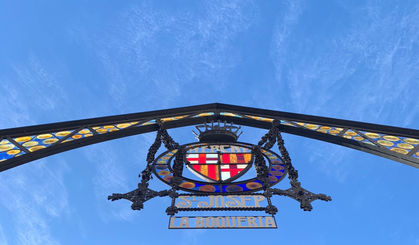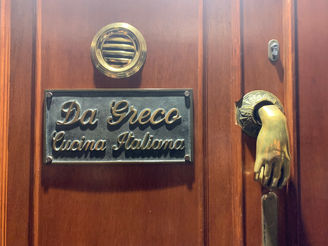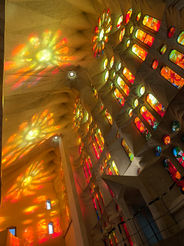
STORIES/
EPISODES

STORIES/
EPISODES

EPISODE 3/
BARCELONA
Hi Hayley! Welcome to Not Your Mom’s Travel Guide, a podcast exploring traveler’s guilt.
Hi Ashley, happy to be here.
Hayley is a current senior at the University of Michigan studying psychology and after graduation, this year is going on to pursue her Ph.D., so congratulations to our future doctor!
Thank you very much.
Today we’re going to be talking about her time spent studying and living abroad in Barcelona. Hayley and I were actually in Barcelona together for the semester. We traveled together most weekends, went out together, and had a very similar experience that I know we both look back on fondly even though they may have pointed out flaws in our study abroad program. So, to start us off can you just give us an overview of what your study abroad experience looked like?
I studied abroad in a program called CEA and this program was mainly comprised of American college students so all of our classes were all juniors from different colleges all over America, but our professors were from either Barcelona or other European countries. And the experience was mainly: we would go to class during the day and then we would experience Barcelona after and each weekend we would usually travel to a different country or we stayed put and enjoyed what Spain had to offer.
Nice. Very similar to mine, obviously. And how long did you live there? How would you describe your living situation, like was your building occupied by mostly study abroad students, or did you live amongst a lot of locals? Can you tell us a little bit about that?
So I got there, I believe it was January 2nd or 3rd, one of the two.
Accurate.
And I was there until April 20th. I lived in a building called Joan Miró on Carrer de Rocafort 102. It was mainly comprised of study abroad students which I didn’t really know going into it. I knew a couple of people were going to live there but, for the most part, it was mainly study abroad students. And it was a pretty safe neighborhood. We were a couple of stops away from CEA which was really convenient so when I was late to class it wasn’t too bad. And there was a supermarket right downstairs. Sushi across the street. Yeah, it was really great living in that neighborhood.
Yeah, so you’d say the neighborhood, in general, was pretty affluent.
It was very safe. It wasn’t like my neighborhood in New York because it was obviously a different country but I didn’t feel unsafe there. It was a bit of a culture shock when I got there though.
Yeah. Because of the language?
The language barrier. The streets were a lot smaller if that makes sense. A little more narrow. A lot more taxis going throughout the day.
Do you feel because of the language barrier a lot of people didn’t speak English? Or do you feel like they definitely lent themselves to tourism and if you had to speak English they would?
Yeah, they really only spoke English, actually. The language barrier was mainly more for when I saw a sign on the street it was mainly written in Catalan. But when I walked into a coffee shop and they heard, “hola,’ in my thick New York accent, they immediately said, “Hi, what can I give you?”
Gotcha, gotcha. So there’s this term that kind of goes hand in hand with gentrification that I just want to talk about. Gentrification is well known as when an area changes over time because of a flood of new, more affluent residents and the other term is called Airbnb-ification, which is obviously sort of this new phenomenon. Basically what it tries to describe is the increase in rents in areas from Airbnb and other rental services-- I know we used one called Study Abroad Apartments-- that can charge more for short term rentals than for long term rentals, which is obviously very evident in Barcelona. I’m sure you would agree?
Totally.
But it’s also pretty detrimental. As of December 2017, ⅓ of home purchases in Barcelona were financed by investment funds. Obviously these investment funds have an objective for profit maximization and when you can charge more for a shorter-term rental, it lends itself to pushing those longer-term, local residents further and further from the city and inherently gentrifies the city center. So, I just wanted to know if you noticed this gentrification or Airbnb-ification in Barcelona?
Yeah, I would think so. My whole building was-- there were some people who lived there full time, but the majority of us were living there for four months at a time and the rent we paid was nothing compared to what it should have been, had we been living there as a full-time resident. It would have been significantly cheaper had they not known we were study abroad students from America.
But because they could charge you they did.
But because they could charge us they did.
And going back to the locals, the few locals that did live in your building. They didn’t think highly of you guys being in the building, did they?
No, they did not like us at all. We would get noise complaints all the time if we were talking past 10 pm. It was-- they did not like the Americans.
Yeah and I’m sure for those exact reasons because their rents were being hiked up and hiked up because of tourists’ existence there.
Yeah, the building location was great and it was safe so naturally we all gravitated towards it and because of that they could make it more expensive for everyone living there.
Yeah, that totally makes sense. And did you notice this in the stores or the restaurants? How they catered towards tourists? What stores did you see in Barcelona that you didn’t necessarily expect there to be?
Well, if you went to where CEA was, there was a Zara, a McDonald’s, there was a--
A Starbucks...
A Starbucks! But they had all these American stores.
Yeah, westernized.
And if you went a couple of metro stops in any direction, you would never find a huge Zara department store there. It was all shops owned by people who live in Barcelona full time and are natives there. So, it really depended on where you were and that would depend on how much real culture you were getting.
Yeah, definitely. And about the subway stops further out from the city center, that also lends itself to gentrification, like the locals being driven out farther and farther from the city center.
Yes, definitely.
I remember I went on a field trip to an area of Barcelona that I never would have ventured to myself, but I was in a Culture of Barcelona class, so we got to explore a little bit outside of the city center and it was basically a glorified flea market, which you can attest to that would never be in Plaza Catalunya.
Yeah, there’s a lot of people selling things on the streets, like in New York City how they sell those dumb little things on the streets.
Exactly like the equivalent of Times Square basically.
Is where our classes were.
Yes, totally. And being that we both used a service similar to Airbnb, that obviously lends itself to this crazy gentrification, do you feel any guilt looking back knowing the effects?
Yeah, I definitely do feel a little bit of guilt because-- I feel guilt for the city of Barcelona that I didn’t give to the people who actually live there. I gave to the big businesses who are running things from afar. And I feel guilt for myself because I realize how much of Spain I actually missed by staying where all of the Americans were. And if I had the opportunity to go back I would definitely do things differently.
Yeah, totally. From my perspective, I think I realized it when we were there for a couple of months, to begin with. I would look around at dinners and I would be like, “Oh, that’s a girl from Indiana.”
“She goes to Syracuse!”
Yeah, exactly and I’m like why am I not seeing any locals around? So I definitely tried to--
Even the food was American half of the time.
Exactly. I tried to branch out as much as I could in the small time that we had after realizing what I missed out on and what my experience was coming towards. So, I totally feel you on that. And obviously you look back on your time fondly, I know I still do, and you said there is stuff you would do differently if you could go back, but do you think when you’re planning your next vacations would you think about doing anything like staying in hotels over Airbnb or changing the way you live and stuff like that?
Definitely. No matter where I go now, even if it’s not Barcelona, somewhere else, I would rather stay in a hotel. I would rather give to the community I’m staying in and help their economy rather than help Airbnb.
And these big investment funds that are buying up all these houses. Exactly.
They don’t need it.
Learning these statistics, I mean I personally didn’t even know the weight of the issue. I could see it from the perspective of a tourist here being like, oh my god, all of us are here paying all this crazy money that we would never pay rents like this even back in New York. We don’t pay that to live here in Ann Arbor. So, I knew it was happening but it just was something that I thought, it has to happen. So I think for me, as well, I would think about staying in hotels over Airbnb. Even, I know it’s so drastic-- if I could recommend to someone to stay in a homestay. Obviously, that doesn’t happen.
That’s a great experience. I had a bunch of friends who did that and you really get a different experience when you do a homestay.
Yeah, totally. Do you know anyone who did a homestay in Barcelona? Or other countries?
I knew one person in one of my classes who stayed in a homestay, but I knew a lot of people from Florence who stayed in them.
Yeah and it’s definitely just a different experience. I think if I could go back I would consider it highly and if not I would at least try to make friends with locals who could give me better recommendations for dinners and stuff like that.
Definitely! I would want to become friends with the locals, the people our age.
Well, we talked a lot today about gentrification, specifically from the tourism industry, and its effects on Barcelona today and it was really interesting to hear your take on it, Hayley. So thank you so much.
Thank you for having me.
Yeah, thank you so much for your time!












